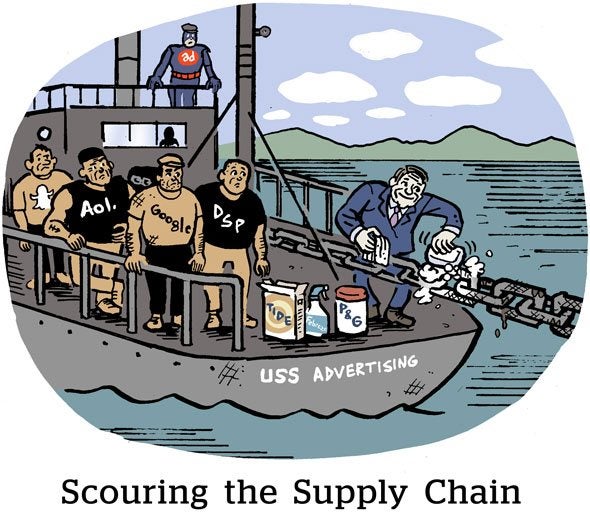The Finger On The Pulse
Global zipper conglomerate YKK is a Japanese company that makes pretty much all the zippers in the world and a great deal of other fasteners, including those used in car seats and medical devices. The brand is ubiquitous in homes but practically unknown, details a worthwhile Bloomberg longread.
But for the purposes of data-driven ad tech audiences, YKK is also crushingly affected by the US tariffs.
Dealing with the real-time fallout of tariffs on manufacturing led YKK to create a new global marketing team. Marketing’s job “is to constantly connect the dots between events, trends and existing infrastructure, so that whatever forces dent earnings in one region can be harnessed for profit in another,” Bloomberg reports.
Teppei Fujimaki, who worked in sales at YKK during President Trump’s first term, recalls that the marketing team was able to alert the finance and sales “in advance, based on how far orders had slipped in China, just how much his team would need to increase capacity to prepare for Bangladesh’s subsequent boom in apparel manufacturing.”
The marketing team has become the data connector for all supply-chain operations.
Rethinking Recommendations
The youths don’t just Google products when they’re shopping in stores anymore; they increasingly ask ChatGPT for recommendations, Ad Age reports.
These shifts in consumer search preferences are giving rise to new forms of SEO known as generative engine optimization (GEO) or answer engine optimization (AEO).
Take skincare brand Cetaphil. Its marketers conducted field work where they claim to have observed between 40% to 50% of Gen Z shoppers consulting ChatGPT in store aisles. As a result, Cetaphil has been rewriting its online product descriptions to highlight the terms these shoppers are likely to be querying with ChatGPT, says Tara Loftis, the brand’s global lead.
Cetaphil also amplifies elements from its marketing campaigns that the generative AI engines tend to associate with credibility. Those elements include, paradoxically, both peer-reviewed journals and examples of word of mouth. For example, Cetaphil now cites more clinical journals on product pages, Loftis says, which are absorbed by the LLMs. It is also a priority to be featured in more influencer content.
Influencer appeal is vital because even generative AI power users sometimes treat the outputs with suspicion, Loftis adds. So they seek validation from TikTok, YouTube and other social platforms.
Wild Child Brands
TV-era consumer brands are likewise suddenly all-in on influencer marketing.
But can they hang with social natives?
Take the pandemic-born sunscreen brand Vacation. Its unimpeachable social media bonafides include co-founders who worked at ad agencies together while living in Brooklyn before moving to Mexico’s Playa del Carmen for a stint. Which is where the idea for sunscreen came from, of course.
For real, Vacation has a marketing plan built around influencers – thousands of freebies to social creators and event organizers whether they post sponsored takes or not. And Vacation is winning treasured in-store real estate. It’s graduating from Target shelves to an end-aisle setup, The Wall Street Journal reports.
Vacation is 13th in the sunscreen category with 1.1% of total sales, per the consumer research firm Numerator. So it’s still a minnow. But a fast-growing minnow.
The big question is whether Vacation’s products are gimmicks or true innovations. Its best seller is sunscreen from an aerosol can like shaving cream or whip cream. Its next-best seller is a fragrant, gelatinous concoction based on a classic French sunscreen called Orange Gelée.
As it grows, the brand has an ongoing brief for “wild” ideas, co-founder Lach Hall tells the Journal.
But Wait! There’s More
Why Yum, Mattel and other big brands are teaming up with OpenAI and Nvidia. [Ad Age]
Blackstone pulls out of investor conglomerate mulling a bid to buy TikTok US. [Reuters]
Auto manufacturer Stellantis says the Trump tariffs cost it $350 million in the first half of the year and it expects $1.75 billion in total tariff-related losses this year. [WSJ]
Advertisers have run ads on Meta seeking to crowdfund the purchase of equipment for the Israeli military in apparent violation of Meta’s ad policies. [The Guardian]
The marketing blitz behind Apple’s summer blockbuster “F1 the Movie,” including an assist from iPhones. [Marketing Brew]
You’ve heard of Grok … now get ready for Baby Grok, a (supposedly) kid-friendly app, announced by Elon Musk on Saturday. [X]
Spotify publishes AI-generated songs from dead artists without permission. [404 Media]
X refuses to comply with a request from the French government to investigate the social media platform’s recommendation engine for evidence of bias or manipulation. [Bloomberg]
The White House has removed The Wall Street Journal from its reporter pool for the president’s weekend trip to Scotland, likely as retribution for the publication’s recent story about Trump’s birthday message to Jeffrey Epstein in 2003. [Politico]











